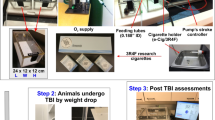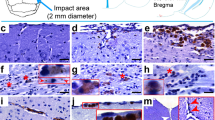Abstract
Mild traumatic brain injuries can have long-term consequences that interfere with the life of the patient and impose a burden on our health care system. Oxidative stress has been identified as a contributing factor for the progression of neurodegeneration following TBI. A major source of oxidative stress for many veterans is cigarette smoking and second-hand smoke, which has been shown to have an effect on TBI recovery. To examine the potential influences of second-hand smoke during recovery from TBI, we utilized a mouse model of closed head injury, followed by repeated exposure to cigarette smoke and treatment with a neuroprotective antioxidant. We found that neither the mild injuries nor the smoke exposure produced axonal damage detectable with amino cupric silver staining. However, complexity in the dendritic arbors was significantly reduced after mild TBI plus smoke exposure. In the hippocampus, there were astrocytic responses, including Cyp2e1 upregulation, after the injury and tobacco smoke insult. This study provides useful context for the importance of lifestyle changes, such as reducing or eliminating cigarette smoking, during recovery from TBI.








Similar content being viewed by others
Data Availability
The datasets generated during and/or analyzed during the current study are available from the corresponding author on reasonable request.
References
Adhami N, Chen Y, Martins-Green M (2017) Biomarkers of disease can be detected in mice as early as 4 weeks after initiation of exposure to third-hand smoke levels equivalent to those found in homes of smokers. Clin Sci 131:2409–2426. https://doi.org/10.1042/CS20171053
Bastian LA, Sherman SE (2010) Effects of the wars on smoking among veterans. J Gen Intern Med 25:102–103. https://doi.org/10.1007/s11606-009-1224-1
Brown DW (2010) Smoking prevalence among US veterans. J Gen Intern Med 25:147–149. https://doi.org/10.1007/s11606-009-1160-0
Burda JE, Bernstein AM, Sofroniew MV (2016) Astrocyte roles in traumatic brain injury. Exp Neurol 275(Pt 3):305–315. https://doi.org/10.1016/j.expneurol.2015.03.020
Cataldo JK, Prochaska JJ, Glantz SA (2010) Cigarette smoking is a risk factor for Alzheimer’s Disease: an analysis controlling for tobacco industry affiliation. J Alzheimers Dis 19:465–480. https://doi.org/10.3233/JAD-2010-1240
Cho H et al (2016) Impact of smoking on neurodegeneration and cerebrovascular disease markers in cognitively normal men. Eur J Neurol 23:110–119. https://doi.org/10.1111/ene.12816
Cojocaru IM, Cojocaru M, Sapira V, Ionescu A (2013) Evaluation of oxidative stress in patients with acute ischemic stroke. Rom J Intern Med 51:97–106
Defense and Veterans Brain Injury Center (2018) DOD Worldwide Numbers for TBI. Washington, DC
Diamond DM, Campbell AM, Park CR, Woodson JC, Conrad CD, Bachstetter AD, Mervis RF (2006) Influence of predator stress on the consolidation versus retrieval of long-term spatial memory and hippocampal spinogenesis. Hippocampus 16:571–576
Durazzo TC, Abadjian L, Kincaid A, Bilovsky-Muniz T, Boreta L, Gauger GE (2013) The influence of chronic cigarette smoking on neurocognitive recovery after mild traumatic brain injury. J Neurotrauma 30:1013–1022. https://doi.org/10.1089/neu.2012.2676
Gairola CG (2006) Animal models of 2nd hand smoking. In: Wang XL, Scott D (eds) Molecular mechanisms for tobacco-induced diseases. Nova Science Publishers, New York, pp 121–132
Gjota-Ergin S, Gokcek-Sarac C, Adali O, Jakubowska-Dogru E (2018) Relationship between the hippocampal expression of selected cytochrome P450 isoforms and the animal performance in the hippocampus-dependent learning task. Neurosci Lett 673:104–110. https://doi.org/10.1016/j.neulet.2018.02.059
Hatic H, Kane MJ, Saykally JN, Citron BA (2012) Modulation of transcription factor Nrf2 in an in vitro model of traumatic brain injury. J Neurotrauma 29:1188–1196. https://doi.org/10.1089/neu.2011.1806
Ho YS et al (2012) Cigarette smoking accelerated brain aging and induced pre-Alzheimer-like neuropathology in rats. PLoS ONE 7:e36752. https://doi.org/10.1371/journal.pone.0036752
Hoge CW, McGurk D, Thomas JL, Cox AL, Engel CC, Castro CA (2008) Mild traumatic brain injury in U.S. Soldiers returning from Iraq. N Engl J Med 358:453–463. https://doi.org/10.1056/NEJMoa072972
Huang J, Okuka M, McLean M, Keefe DL, Liu L (2009) Effects of cigarette smoke on fertilization and embryo development in vivo. Fertil Steril 92:1456–1465. https://doi.org/10.1016/j.fertnstert.2008.07.1781
Huang J, Okuka M, Lu W, Tsibris JC, McLean MP, Keefe DL, Liu L (2013) Telomere shortening and DNA damage of embryonic stem cells induced by cigarette smoke. Reprod Toxicol 35:89–95. https://doi.org/10.1016/j.reprotox.2012.07.003
Huf F et al (2019) Comparative study on the effects of cigarette smoke exposure, ethanol consumption and association: Behavioral parameters, apoptosis, glial fibrillary acid protein and S100beta immunoreactivity in different regions of the rat hippocampus. Alcohol 77:101–112. https://doi.org/10.1016/j.alcohol.2018.08.009
Kaisar MA, Kallem RR, Sajja RK, Sifat AE, Cucullo L (2017) A convenient UHPLC-MS/MS method for routine monitoring of plasma and brain levels of nicotine and cotinine as a tool to validate newly developed preclinical smoking model in mouse. BMC Neurosci 18:71. https://doi.org/10.1186/s12868-017-0389-5
Kaisar MA, Sivandzade F, Bhalerao A, Cucullo L (2018) Conventional and electronic cigarettes dysregulate the expression of iron transporters and detoxifying enzymes at the brain vascular endothelium: In vivo evidence of a gender-specific cellular response to chronic cigarette smoke exposure. Neurosci Lett 682:1–9. https://doi.org/10.1016/j.neulet.2018.05.045
Lee IN, Lin MH, Chung CY, Lee MH, Weng HH, Yang JT (2012) Chronic cigarette smoke exposure enhances brain-derived neurotrophic factor expression in rats with traumatic brain injury. Metab Brain Dis 27:197–204. https://doi.org/10.1007/s11011-012-9294-x
Machaalani R, Thawley M, Huang J, Chen H (2019) Effects of prenatal cigarette smoke exposure on BDNF, PACAP, microglia and gliosis expression in the young male mouse brainstem. Neurotoxicology 74:40–46. https://doi.org/10.1016/j.neuro.2019.05.009
McDowell S, Whyte J, D’Esposito M (1997) Working memory impairments in traumatic brain injury: evidence from a dual-task paradigm. Neuropsychologia 35:1341–1353
Milman A, Rosenberg A, Weizman R, Pick CG (2005) Mild traumatic brain injury induces persistent cognitive deficits and behavioral disturbances in mice. J Neurotrauma 22:1003–1010. https://doi.org/10.1089/neu.2005.22.1003
Morrison HW, Filosa JA (2013) A quantitative spatiotemporal analysis of microglia morphology during ischemic stroke and reperfusion. J Neuroinflammation 10:4. https://doi.org/10.1186/1742-2094-10-4
Morrison HW, Filosa JA (2016) Sex differences in astrocyte and microglia responses immediately following middle cerebral artery occlusion in adult mice. Neuroscience 339:85–99. https://doi.org/10.1016/j.neuroscience.2016.09.047
Paulson JR et al (2010) Nicotine exacerbates brain edema during in vitro and in vivo focal ischemic conditions. J Pharmacol Exp Ther 332:371–379. https://doi.org/10.1124/jpet.109.157776
Ratliff WA, Saykally JN, Mervis RF, Lin X, Cao C, Citron BA (2019) Behavior, protein, and dendritic changes after model traumatic brain injury and treatment with nanocoffee particles. BMC Neurosci 20:44. https://doi.org/10.1186/s12868-019-0525-5
Ratliff WA, Delic V, Pick CG, Citron BA (2020a) Dendritic arbor complexity and spine density changes after repetitive mild traumatic brain injury and neuroprotective treatments. Brain Res 1746:147019. https://doi.org/10.1016/j.brainres.2020.147019
Ratliff WA, Mervis RF, Citron BA, Schwartz B, Rubovitch V, Schreiber S, Pick CG (2020b) Effect of mild blast-induced TBI on dendritic architecture of the cortex and hippocampus in the mouse. Sci Rep 10:2206. https://doi.org/10.1038/s41598-020-59252-4
Ratliff WA, Qubty D, Delic V, Pick CG, Citron B (2020c) Repetitive mild traumatic brain injury and transcription factor modulation. J Neurotrauma. https://doi.org/10.1089/neu.2020.7005
Saykally JN, Rachmany L, Hatic H, Shaer A, Rubovitch V, Pick CG, Citron BA (2012) The nuclear factor erythroid 2-like 2 activator, tert-butylhydroquinone, improves cognitive performance in mice after mild traumatic brain injury. Neuroscience 223:305–314. https://doi.org/10.1016/j.neuroscience.2012.07.070
Saykally JN, Ratliff WA, Keeley K, Pick CG, Mervis RF, Citron BA (2018) Repetitive mild closed head injury alters protein expression and dendritic complexity in a mouse model. J Neurotrauma 35:139–148
Sherman SE (2008) A framework for tobacco control: lessons learnt from Veterans Health Administration. BMJ 336:1016–1019. https://doi.org/10.1136/bmj.39510.805266.BE
Siedler DG, Chuah MI, Kirkcaldie MT, Vickers JC, King AE (2014) Diffuse axonal injury in brain trauma: insights from alterations in neurofilaments. Front Cell Neurosci 8:429. https://doi.org/10.3389/fncel.2014.00429
Sivandzade F, Cucullo L (2019a) Anti-diabetic countermeasures against tobacco smoke-dependent cerebrovascular toxicity: use and effect of rosiglitazone. Int J Mol Sci. https://doi.org/10.3390/ijms20174225
Sivandzade F, Cucullo L (2019b) Assessing the protective effect of rosiglitazone against electronic cigarette/tobacco smoke-induced blood-brain barrier impairment. BMC Neurosci 20:15. https://doi.org/10.1186/s12868-019-0497-5
Sivandzade F, Alqahtani F, Sifat A, Cucullo L (2020) The cerebrovascular and neurological impact of chronic smoking on post-traumatic brain injury outcome and recovery: an in vivo study. J Neuroinflamm 17:133. https://doi.org/10.1186/s12974-020-01818-0
Speck AE et al (2011) Cigarette smoke inhibits brain mitochondrial adaptations of exercised mice. Neurochem Res 36:1056–1061. https://doi.org/10.1007/s11064-011-0447-9
Stuss D, Ely P, Hugenholtz H, Richard M, LaRochelle S, Poirier C, Bell I (1985) Subtle neuropsychological deficits in patients with good recovery after closed head injury. Neurosurgery 17:41–47
Sussan TE et al (2009) Targeting Nrf2 with the triterpenoid CDDO-imidazolide attenuates cigarette smoke-induced emphysema and cardiac dysfunction in mice. Proc Natl Acad Sci USA 106:250–255. https://doi.org/10.1073/pnas.0804333106
Switzer RC 3rd (2000) Application of silver degeneration stains for neurotoxicity testing. Toxicol Pathol 28:70–83. https://doi.org/10.1177/019262330002800109
Tashlykov V, Katz Y, Gazit V, Zohar O, Schreiber S, Pick CG (2007) Apoptotic changes in the cortex and hippocampus following minimal brain trauma in mice. Brain Res 1130:197–205. https://doi.org/10.1016/j.brainres.2006.10.032
Tindberg N, Baldwin HA, Cross AJ, Ingelman-Sundberg M (1996) Induction of cytochrome P450 2E1 expression in rat and gerbil astrocytes by inflammatory factors and ischemic injury. Mol Pharmacol 50:1065–1072
Tuon T et al (2010) Effects of moderate exercise on cigarette smoke exposure-induced hippocampal oxidative stress values and neurological behaviors in mice. Neurosci Lett 475:16–19. https://doi.org/10.1016/j.neulet.2010.03.030
Tweedie D et al (2007) Apoptotic and behavioral sequelae of mild brain trauma in mice. J Neurosci Res 85:805–815. https://doi.org/10.1002/jnr.21160
Tweedie D et al (2013) Changes in mouse cognition and hippocampal gene expression observed in a mild physical- and blast-traumatic brain injury. Neurobiol Dis 54:1–11. https://doi.org/10.1016/j.nbd.2013.02.006
Wang Z et al (2020) Acute and chronic molecular signatures and associated symptoms of blast exposure in military breachers. J Neurotrauma 37:1221–1232. https://doi.org/10.1089/neu.2019.6742
Yu R et al (2016) tobacco smoke-induced brain white matter myelin dysfunction: potential co-factor role of smoking in neurodegeneration. J Alzheimers Dis 50:133–148. https://doi.org/10.3233/jad-150751
Zhang ZW et al (2020) TBHQ improved neurological recovery after traumatic brain injury by inhibiting the overactivation of astrocytes. Brain Res 1739:146818. https://doi.org/10.1016/j.brainres.2020.146818
Zhong Y et al (2012) Induction of brain CYP2E1 by chronic ethanol treatment and related oxidative stress in hippocampus, cerebellum, and brainstem. Toxicology 302:275–284. https://doi.org/10.1016/j.tox.2012.08.009
Zohar O, Schreiber S, Getslev V, Schwartz JP, Mullins PG, Pick CG (2003) Closed-head minimal traumatic brain injury produces long-term cognitive deficits in mice. Neuroscience 118:949–955.
Acknowledgements
We thank Andrea Smith and Tai Vo for expert animal assistance, Miseanne Tang for technical assistance, and Dr. John C. M. Tsibris for the loan of the smoking system.
Funding
This study was supported by the Department of Veterans Affairs (Veterans Health Administration, Office of Research and Development, Rehabilitation Research and Development (I01RX001520)), the Assistant Secretary of Defense for Health Affairs through the Congressionally Directed Gulf War Illness Research Program (W81XWH-16–1-0626), the Florida Department of Health James and Esther King Biomedical Research Program (4KB14), and The Bay Pines Foundation. The funding sources had no involvement in study design; in the collection, analysis, or interpretation of data; in the writing of the report; or in the decision to submit the article for publication.
Author information
Authors and Affiliations
Contributions
WAR performed animal experiments, analyzed and interpreted the data, created figures, and wrote the manuscript. JNS conceived and performed the experiments. KLK and DCD performed animal experiments and data analysis. KEM performed data analysis and interpretation. MO assisted with experiments related to the use of the smoking machine. RFM performed the Golgi staining and dendritic analysis. VD analyzed and interpreted data and contributed significantly to the writing to the manuscript. BAC conceived the studies, analyzed data, and was a major contributor in writing the manuscript. All authors read and approved the final manuscript.
Corresponding author
Ethics declarations
Conflict of interest
The authors declare no competing interests. The contents do not represent the views of the Department of Veterans Affairs or the US Government and the opinions, interpretations, conclusions and recommendations are those of the authors and are not necessarily endorsed by the Department of Defense.
Ethical Approval
The animal protocol was approved by the Bay Pines VA Institutional Animal Care and Use Committee (IACUC) and performed in accordance with all institutional, agency, and governmental Animal Welfare Regulations.
Additional information
Publisher's Note
Springer Nature remains neutral with regard to jurisdictional claims in published maps and institutional affiliations.
Rights and permissions
About this article
Cite this article
Ratliff, W.A., Saykally, J.N., Keeley, K.L. et al. Sidestream Smoke Affects Dendritic Complexity and Astrocytes After Model Mild Closed Head Traumatic Brain Injury. Cell Mol Neurobiol 42, 1453–1463 (2022). https://doi.org/10.1007/s10571-020-01036-5
Received:
Accepted:
Published:
Issue Date:
DOI: https://doi.org/10.1007/s10571-020-01036-5




